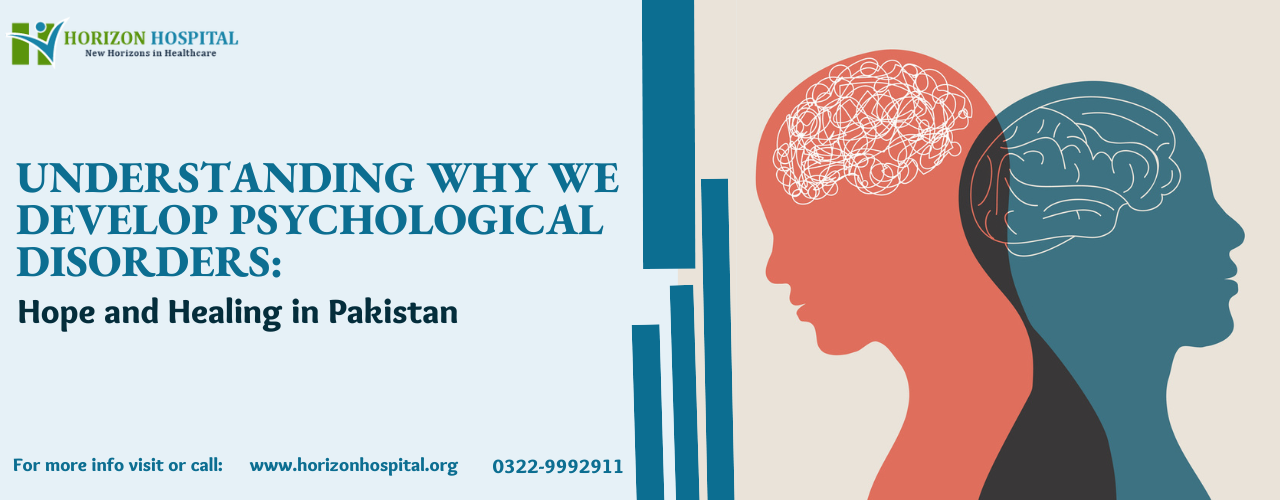
Understanding Why We Develop Psychological Disorders: Hope and Healing in Pakistan
Part- 1
Mental health is crucial to maintain overall well-being. Just like physical health, our mental state can be impacted by various factors. Unfortunately, in Pakistan, cultural and social stigmas can surround mental health issues, making it challenging to understand why psychological disorders develop. However, seeking help and healing is possible with the first step of understanding the different causes of psychological disorders. This article aims to explore the various causes of psychological disorders and highlights the importance of professional support available at our hospital.
Risk Factors for Psychological Disorders
Psychological disorders do not have a single cause. Typically, a complex combination of factors contributes to their development. Let’s explore some key risk factors further:
⇒ Genetics:
Mental health conditions may be hereditary. If a family member has a psychological disorder, you could be at an increased risk. Nonetheless, a family history does not ensure that you will develop one. It is more of a predisposition, and various other factors can impact whether the disorder appears. These factors encompass environmental stressors, life events, and lifestyle decisions. For instance, an individual with a genetic inclination for depression might have a higher chance of developing the disorder following a traumatic event or prolonged stress.
⇒ Brain Chemistry:
Imbalances in brain chemicals like serotonin, dopamine, and norepinephrine can play a significant role in anxiety, depression, and other disorders. These chemicals act as messengers in the brain, and disruptions in their levels can affect mood, sleep, and behavior. For instance, low levels of serotonin are often linked to depression, while imbalances in dopamine can contribute to symptoms of schizophrenia. Mental health professionals can assess brain chemistry through various methods and may recommend medication to restore balance and alleviate symptoms.
⇒ Life Experiences:
Traumatic events, chronic stress, abuse (physical, emotional, sexual), neglect, and significant life changes can significantly impact mental health. These experiences can overwhelm your coping mechanisms and leave lasting emotional scars. They can also trigger the release of stress hormones like cortisol, which can disrupt brain function and contribute to the development of mental health problems.
Here are some specific examples of how life experiences can impact mental health:
⇒ Witnessing violence or experiencing a natural disaster can trigger post-traumatic stress disorder (PTSD). PTSD is characterized by flashbacks, nightmares, and severe anxiety related to the traumatic event.
⇒ Chronic stress due to financial difficulties or work pressures can lead to anxiety and depression. Chronic stress can lead to feelings of helplessness, hopelessness, and difficulty concentrating
⇒ Childhood abuse or neglect can have a profound impact on mental health, increasing the risk of depression, anxiety, substance abuse, and personality disorders.
⇒ Medical Conditions: :
Certain medical conditions, including chronic pain, hormonal imbalances, and brain injuries, can increase the risk of psychological disorders. For instance, thyroid disorders can affect mood regulation, and chronic pain can lead to depression and anxiety. These medical conditions can directly affect brain function or trigger emotional distress, contributing to the development of mental health problems. It’s essential to address these conditions’ physical and mental health aspects for optimal well-being.
⇒ Substance Abuse:
Drug and alcohol misuse can directly affect brain function and contribute to the development of mental health problems. Substances can interfere with the production and function of neurotransmitters, leading to mood swings, paranoia, and difficulty concentrating. In some cases, mental health disorders can lead to substance abuse as a coping mechanism, creating a complex cycle.
Recognizing the Signs of a Psychological Disorder
While experiences vary, some common signs might indicate a psychological disorder:
⇒ Persistent feelings of sadness, hopelessness, or anxiety that last for weeks or even months. These feelings can significantly interfere with your daily life and ability to function.
⇒ Changes in sleep patterns, such as sleeping too much or too little, significantly impact daily functioning. You may experience difficulty falling asleep, staying asleep, or waking up feeling unrested.
⇒ Significant weight loss or gain due to changes in appetite that are not related to dieting. This can be a sign of underlying depression or anxiety that affects your eating habits.
⇒ Difficulty concentrating, making decisions, or remembering things. These cognitive difficulties can significantly impact your work, studies, and daily activities.
⇒ Withdrawal from social activities and loved ones leads to feelings of isolation. This social withdrawal can be a symptom of depression or anxiety, or it can be a coping mechanism that ultimately worsens the problem.
⇒ Increased irritability or anger that is out of proportion to the situation. These emotional outbursts can strain relationships and make it challenging to manage daily life.
⇒ Physical symptoms like headaches, body aches, or fatigue that have no apparent physical cause. These physical symptoms can be caused by stress or anxiety, or they may be a sign of an underlying mental health condition.
⇒ Suicidal thoughts or feelings of worthlessness that make you feel like life is not worth living. This is a serious warning sign that requires immediate professional help. If you are experiencing suicidal thoughts, please reach out to a crisis hotline or mental health professional right away.
Here are some resources available in Pakistan:
National Suicide Prevention Lifeline (Pakistan): 1033
Sahil – Aahan (Mental Health Helpline): 021-34441418
It’s important to remember that occasional sadness, anxiety, or stress are normal human experiences. However, if these symptoms become persistent and interfere with your ability to work, study, maintain relationships, or enjoy life, seeking professional help is crucial. A mental health professional can assess your symptoms, diagnose any underlying conditions, and develop a treatment plan to help you manage your mental health and improve your overall well-being.
